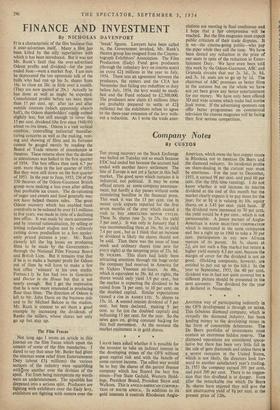FINANCE AND INVESTMENT
By NICHOLAS DAVENPORT IT is a characteristic of the film business that it over-advertises itself. Many a film has been killed by the silly superlatives with which it has been introduced. But it was not Mr. Rank's fault that the over-advertised Odeon profits and dividend--for the year ended June-were a market flop. I am sure he deprecated the too optimistic talk of the bulls who had run up his 5s. shares from 16s. to close on 26s. in little over a month. (They are now quoted at 20s.) Actually he has done as well as might be expected. Consolidated profits before tax were more than 15 per cent. up: after tax and after outside interests (which apparently absorb half), the Odeon shareholders' equity earned slightly less, but still enough to cover the 15 per cent. dividend (the first since 1948/49) about twelve times. Odeon is a vast vertical combine, controlling industrial manufac- turing concerns as well as the making, rent- ing and showing of films and its fortunes cannot be gauged merely by reading the Board of Trade returns of attendances at theatres. These returns show that the decline in attendances was halted in the first quarter of 1954. The box offices then took 6.7 per cent. more than in the last quarter of 1953. But they were still down on the first quarter of 1953. In the year to June, 1953, 236 of the 550 theatres of the Odeon-Gaumont British group were making a loss even after selling that profitable ice cream. The de-rationing of sugar and sweets and food generally may not have helped theatre sales. The great Odeon recovery which has enabled bank overdrafts to be reduced by over £11 millions in five years, was made in spite of a declining box office. It was made by stern economies and by internal rationalisation, by selling or letting redundant studios and by ruthlessly cutting down production to a few moder- ately priced pictures a year. Mr. Rank cleverly left the big losses on producing films to be made by the Government- through the National Film Finance Board and British Lion. But it remains true that if he is to make a bumper profit for Odeon out of films he will have to make a few box office 'winners' in his own studio. Fortuni t ly he has had two in Genevieve and Doctor in the House but that is not nearly enough. But I get the impression that he is now more interested in producing flour than films. The direction of Odeon is left to Mr. John Davis on the business side and to Sir Michael Balcon in the studios. Mr. Rank is content to set them a good example by increasing the dividends of Ranks the millers, whose shares not only go up but stay up.
The Film Fracas Not long ago I wrote an article in this journal on the film fracas which upset the conceit of some of the film mandarins. I dared to say that since Mr. Butler had given the cinemas some relief from Entertainment Duty (about £34 millions) the various sections of the industry were squabbling withIone another over the division of the spoil. Far from being intemperate my words were an understatement. The squabble has deepened into a serious split. Producers are fighting with exhibitors over the Eady levy, exhibitors are fighting with renters over the 'break' figures. Lawyers have been called in, the. Government invoked, Mr. Rank's theatre group has resigned from the Cinema- tograph Exhibitors' Association. The Film Production (Eady) Fund gave producers (through the voluntary levy on cinema seats) an extra £2f millions in the year to July, 1954. There was an agreement between the producers, the renters and the CEA last November that failing any reduction in duty before July, 1954, the levy would be modi- fied and the Fund reduced to £2,300,000. The producers now claim £3 millions (they are probably prepared to settle at £21 millions) but the exhibitors refuse to agree to the three-year extension of the levy with- out a reduction. As I write the trade asso- ciations are meeting in final conference and I hope that a fair compromise will be reached. But the film magnates must expect public criticism of their trade disputes. It is we-the cinema-going public-who pay the piper while they call the tune. We have been denied any reduction in the price of our seats in spite of the reduction in Enter- tainment Duty. We have even been told this week by the Odeon-Gaumont, ABC and Granada circuits that our 2s. 3d., 2s. 8d. and 3s. Id. seats are to go up by Id. The chairman of ABC promises us better films in the autumn but on the whole we have not yet been given any better entertainment for our money. We have only been offered 3D and wide screens which make bad stories look worse. If the advertising sponsors can offer better programmes on commercial television the cinema magnates will be facing their first serious competition.


































 Previous page
Previous page